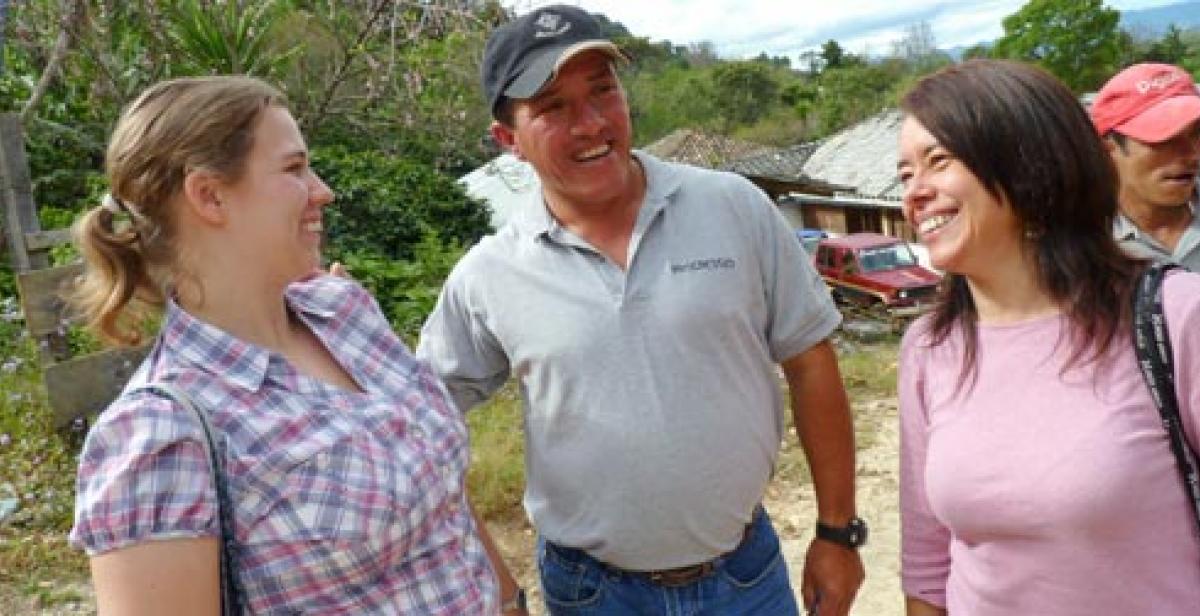The Honduras Progressio team was delighted to introduce Lisa Barrett, political and consular affairs officer in the UK Embassy in Guatemala, to our field work in Honduras in December. The British consul stepped into Progressio’s world first hand, visiting a couple of Progressio’s projects in Nahuaterique and Marcala, in western Honduras.
In those areas, Progressio is both tackling extreme poverty and malnutrition, and backing the people of Nahuaterique in their struggle for legal recognition as Honduran citizens.
Stories from campesinos
The UK consul had the opportunity to hear stories from campesinos who used to feed themselves and their children by only growing maize, sometimes coupled with beans. Through Progressio’s well-developed agro-ecology model, however, they are now diversifying their crops with broccoli, cabbage, and carrots. Consequently, they are improving their diet, health and income.
Our development workers have trained them on how to install and maintain drip irrigation systems. As a result, they are now able to grow vegetables also in the dry season. In addition, they have learnt how to produce their own organic fertilisers and pesticides.
Surprising successes
To their astonishment, that way they are avoiding pests and crop infestations, while saving money. Several small-scale farmers we talked to in the Las Pavas community in Marcala conceded they thought that was not possible! They previously got indebted buying expensive chemical agricultural inputs or got no inputs at all.
These days they are getting prepared for Marcala’s first organic farmers’ fair. Starting this month, the two-day event is set to take place on a monthly basis, and is intended as an opportunity to start opening up local markets for organic produce.
Supporting citizens
Lisa Barrett stated that that the UK Embassy wants to “strengthen its relationship with citizens with a willingness to move the country forward, take part in the common life and improve productive and economic opportunities in Honduras and El Salvador.”
The British consul and the Progressio team visited Nahuaterique, an example of motivation and willingness to struggle for progress come hell or high water. Set high up in the mountains bordering El Salvador, Nahuaterique has been struggling for legal recognition since the early 1990s. This town was the subject of a border dispute between the two countries, Honduras and El Salvador. In 1992, the International Court of Justice in The Hague ruled that from then on, it would belong to Honduras while Nahuateriqueans would hold dual nationality.
Overcoming problems
Yet despite the ruling, most of Nahauterique’s population has been effectively stateless for more than 18 years. Only 2,000 people in a town of 7,000 inhabitants have received identity papers from the Honduran state so far. And a scarce 20 percent of the total census has been given land ownership titles: 617 titles, which were only given out last year.
This has far-reaching implications: lack of security over land ownership prevents the State from investing in schools. There exists only one primary school in the territory; and no health care nor medicines available.
“We do not want to leave those problems to our children,” said Oscar Argueta, provisional mayor of Nahuaterique. “We want to become legal so as to attain more opportunities for development.”
Progressio’s role
Progressio’s development workers are backing the people of Nahuaterique both on the agroecologic and governance fronts – Progressio is in fact the only organisation which has supported the Nahuaterique process side by side since the 1992 ruling. One front goes hand in hand with the other, as Progressio development worker José Ramos pointed out:
“Combating malnutrition and ensuring natural resources conservation is pivotal in a community living in extreme poverty and under the threat of floods and other phenomena related to climate change. Yet getting people’s naturalisation and having their community registered by the state as a municipality are prerequisites to bring basic development to the people.”
A motivated community
Xiomara Ventura, the regional manager for Progressio’s work in Central America, acknowledged that “so far, you [the people of Nahuaterique] have not been given the chance to become citizens, but you are a very committed and motivated community that really wants to move forward.”
Xiomara praised the advocacy work of the Nahuaterique provisional council saying it was “an example of regional integration work,” they are undertaking by sitting on the same table the States of Honduras and El Salvador to guarantee the rights of Nahuateriqueans are respected. She assured them: “We will accompany you so that you find the shortest way to reach your goals and aspirations.”
An interesting visit
At the end of the day, the UK consul found the visit “interesting and worthwhile.” She said: “It really was informative for me to see some of your project work in action and talk to the people in the communities and cooperatives.”
Lisa Barrett told us she looks forward to visiting another of Progressio’s projects in Honduras again early next year in the the Copan region of western Honduras. Indeed, the UK Embassy is supporting a Progressio-run project in the area which provides support to the Maya Chortí indigenous community. The project seeks to articulate their human rights and needs in dialogue with the authorities, and so make their voices heard in government policies to ensure their rights are respected.
By Nuria Zayas, a Progressio development worker in Honduras.
Photo: Oscar Argueta (centre), provisional mayor of Nahuaterique, with UK Consul Lisa Barrett (left) and Progressio’s Xiomara Ventura (right). (Photo © Nuria Zayas/Progressio)



